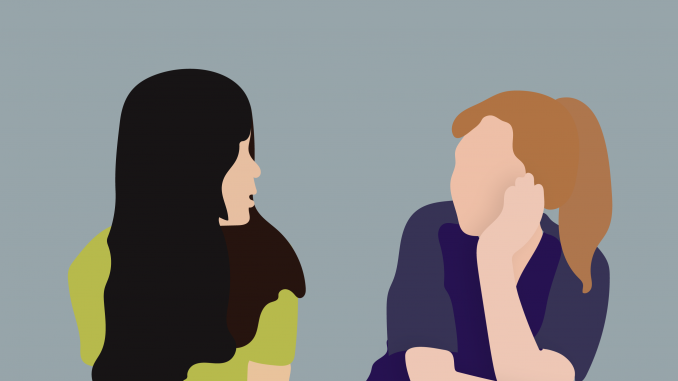
The day I was assigned this piece, I was depressed and spent most of the day crying from anxiety.
Walking through campus, I felt like a balloon about to pop. I wasn’t sure what made me feel this way, but I had a crippling sense of fear something was going to happen. I wanted to burst into a puddle of tears.
This feeling is not foreign to me, I’ve dealt with depression and anxiety for most of my teenage years.
Many people think it is rude to talk about mental health, because they believe you are being inconsiderate of the feelings of those around you. But talking about mental health will help break the stigma of it being selfish by acknowledging it and making those struggling feel more comfortable sharing their experiences.
Mental health issues that people like myself, my classmates and even professional athletes, like Simone Biles, deal with are not made up. Our emotions are real and need to be treated as such. There are many conversations we must have about mental health, especially now since September is National Suicide Prevention Month.
An estimated 51.5 million adults in the United States are suffering from a mental illness, according to a 2019 report from the National Institute of Mental Health. There were more than 44,834 deaths by suicide in the United States in 2020, The New York Times reported.
The number of those struggling with mental illness increased during the COVID-19 pandemic. For example, 56.2 percent of young adults aged eighteen to twenty-four reported increased symptoms of anxiety and depression as a result of the pandemic, according to the Kaiser Family Foundation.
Alexa Kotas, a freshman marketing major, has dealt with anxiety and depression since she was in eighth grade, she said.
“Anxiety and depression make me be in my head more than I would usually be,” Kotas said. “With depression it makes it difficult to get out of bed some days.”
When she talks about her mental health, people often dismiss or minimize her feelings because of beliefs that mental health struggles are fake, she said.
Public stigmas, which involve negative attitudes toward mental illness, come from lack of understanding or fear about mental health, according to the American Psychiatric Association.
Kotas feels like many people assume those with mental illnesses use it to seek attention, she said.
“People respond by saying I’m claiming to have anxiety and depression for attention or that I don’t have it at all,” Kotas added.
When Olympic gymnast Simone Biles withdrew from the U.S. Women’s Gymnastics Team and individual all-around finals at the 2020 Tokyo Olympic Games because of mental health concerns, she showed the world that mental health struggles affect everyone regardless of wealth or fame.
Biles said that she gave an outlet for athletes to speak up about their mental health and their well-being, the Associated Press reported.
“Simone Biles was managing her mental health,” wrote Kareem Johnson, a psychology professor, in an email to The Temple News. “Making choices so that she could feel like she was at her best and living a life she can enjoy.”
Many people, myself included, feel isolated when it comes to mental health. When a decorated Olympian says she feels the same way, it makes our struggles seem valued and acknowledged.
Stigmas associated with mental illness also cause people to feel as though they cannot seek professional help, according to the APA.
It is important that we talk about mental health issues so we can eliminate the belief that they are a myth.
“We would benefit from more education around mental health and how to receive the right treatment,” said Mona Sarshar, a psychologist at the Tuttleman Counseling Center. “Individuals with mental health issues can succeed in life and in their career with the right help.”
Disorders, like anxiety and depression, can be well hidden and we may not be aware that someone is suffering from mental illness the same way we know someone is suffering from a broken leg.
When helping a friend or loved one who is suffering from mental illness, it’s important to listen, Kotas said.
“We don’t know what’s going on in someone else’s mind,” Kotas said. “It’s for them to share and not for you to assume.”
In honor of National Suicide Prevention Month, we need to have open conversations about mental health so we can normalize it and make people feel comfortable asking for help. I know from my own personal experience, mental health is not a myth, the only way for people to know you are struggling is by talking.


Be the first to comment